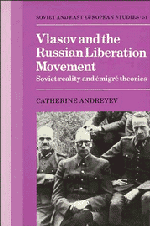Crossref Citations
This Book has been
cited by the following publications. This list is generated based on data provided by Crossref.
Koch, H. W.
1988.
Operation Barbarossa – The Current State of the Debate.
The Historical Journal,
Vol. 31,
Issue. 2,
p.
377.
Wrong, Dennis H.
1996.
Truth, misinterpretation, or left-wing McCarthyism?.
Sociological Forum,
Vol. 11,
Issue. 4,
p.
613.
Rees, E. A.
1998.
Russian Nationalism Past and Present.
p.
77.
Maguire, Keith
1998.
Policing the Russian Mafia.
The Police Journal: Theory, Practice and Principles,
Vol. 71,
Issue. 3,
p.
245.
Sharfman, Glenn
2000.
The quest for justice: The reaction of the Ukrainian-American community to the John Demjanjuk trials.
Journal of Genocide Research,
Vol. 2,
Issue. 1,
p.
65.
Suny, Ronald Grigor
2006.
The Cambridge History of Russia.
Clark, Katerina
and
Schlögel, Karl
2008.
Beyond Totalitarianism.
p.
396.
Baranova, Olga
2008.
Nationalism, anti-Bolshevism or the will to survive? Collaboration in Belarus under the Nazi occupation of 1941–1944.
European Review of History: Revue europeenne d'histoire,
Vol. 15,
Issue. 2,
p.
113.
Mumford, Michael D.
Bedell‐Avers, Katrina E.
Hunter, Samuel T.
Espejo, Jazmine
Eubanks, Dawn
and
Connelly, Mary Shane
2008.
Violence in Ideological and Non‐Ideological Groups: A Quantitative Analysis of Qualitative Data1.
Journal of Applied Social Psychology,
Vol. 38,
Issue. 6,
p.
1521.
Motyl, Alexander J.
2010.
Why is the “KGB Bar” possible? Binary morality and its consequences.
Nationalities Papers,
Vol. 38,
Issue. 5,
p.
671.
DELAPLACE, GRéGORY
2012.
Parasitic Chinese, vengeful Russians: ghosts, strangers, and reciprocity in Mongolia.
Journal of the Royal Anthropological Institute,
Vol. 18,
Issue. s1,
Arielli, Nir
and
Collins, Bruce
2013.
Transnational Soldiers.
p.
1.
Oskolova, T.
Cherepanov, M.
and
Shisheliakina, A.
2015.
Nationalism in a Russian Multicultural Region*.
Social Science Quarterly,
Vol. 96,
Issue. 3,
p.
860.
Franko, Mark
2017.
Serge Lifar and the Question of Collaboration with the German Authorities under the Occupation of Paris (1940–1949).
Dance Research,
Vol. 35,
Issue. 2,
p.
218.
McBride, Jared
2017.
Contesting the Malyn Massacre. The Legacy of Inter-Ethnic Violence and the Second World War in Eastern Europe.
Soudobé dějiny,
Vol. 24,
Issue. 4,
p.
477.
Persian, Jayne
2018.
Cossack Identities: From Russian Émigrés and Anti-Soviet Collaborators to Displaced Persons.
Immigrants & Minorities,
Vol. 36,
Issue. 2,
p.
125.
Tromly, Benjamin
2020.
Émigré Politics and the Cold War: The National Labor Alliance (NTS), United States Intelligence Agencies and Post-War Europe.
Contemporary European History,
Vol. 29,
Issue. 1,
p.
44.
Persian, Jayne
2020.
Memory and Family in Australian Refugee Histories.
p.
47.
Laryš, Martin
2024.
‘We Will Conquer the Motherland’: How Russian Nationalists in Exile Legitimise Their Fight Against Putin’s Regime.
Europe-Asia Studies,
Vol. 76,
Issue. 3,
p.
339.



